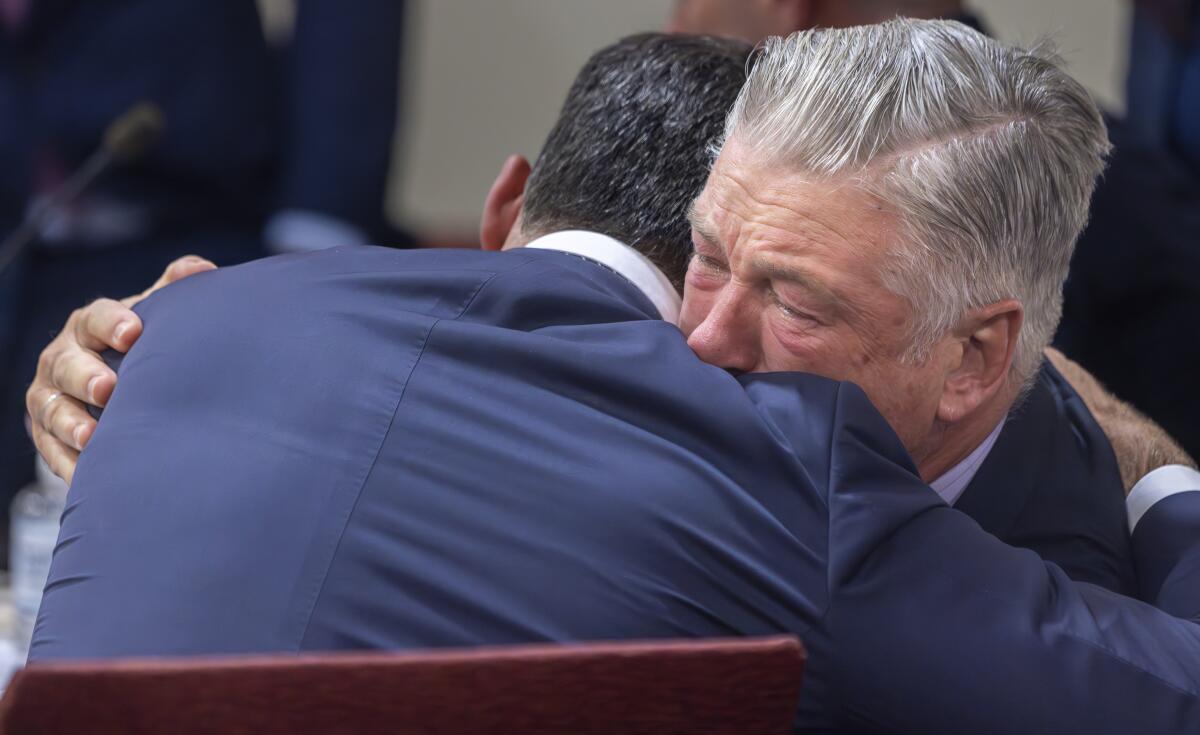Defending the state’s handling of the “Rust” shooting case, New Mexico special prosecutor Kari T. Morrissey has asked the judge to take another look at the circumstances that prompted the dismissal of Alec Baldwin’s manslaughter charge.
In a court filing Friday, Morrissey asked New Mexico First Judicial Circuit Court Judge Mary Marlowe Sommer to reconsider her decision to throw out Baldwin’s manslaughter case.
Six weeks ago, Marlowe Sommer dramatically ended Baldwin’s criminal trial after potential new evidence came to light. A former police officer who lives in Arizona had months earlier delivered nearly two dozen .45-caliber rounds to the Santa Fe County Sheriff’s Department, saying they might have been related to the “Rust” shooting 2½ years earlier that killed cinematographer Halyna Hutchins.
The former officer, Troy Teske, is a friend of Thell Reed, a noted Hollywood armorer and father of “Rust” weapons handler Hannah Gutierrez, who was convicted of involuntary manslaughter in March in the shooting. Teske was scheduled to be a witness in her trial but Gutierrez’s defense attorney decided not to call Teske to testify.
After the Gutierrez trial and before leaving Santa Fe, Teske turned over the ammunition he had brought to New Mexico to local sheriff’s deputies. The casings of three of the rounds appeared to match the fatal bullet in the “Rust” movie set shooting, deputies later testified.
During Baldwin’s trial, the Santa Fe County sheriff’s crime scene technician testified that she took the rounds from Teske and placed them into evidence storage. However, the rounds were not included as part of the “Rust” shooting evidence, later testimony showed.
Instead the ammunition was filed under a different case number — a fact that Baldwin’s attorneys pounced on as evidence that the state was allegedly hiding material that might have been helpful to Baldwin’s defense.
The judge agreed and dismissed the criminal charge.

Alec Baldwin, right, hugs his defense attorney Alex Spiro after District Court Judge Mary Marlowe Sommer threw out the involuntary manslaughter charge against the actor.
(Luis Sánchez Saturno / Associated Press)
In her 52-page motion, Morrissey argued that defense attorneys knew more about the Teske rounds than she did. She wrote the situation surrounding the rounds did not rise to a level that warranted Marlowe Sommer’s dismissal of the case with prejudice, meaning it could not be refiled.
Morrissey asserted that the tardy disclosure of the Teske rounds did not hamper Baldwin’s defense because his attorneys apparently knew about the ammunition before the trial. Morrissey also argued the rounds were unrelated to the charges that Baldwin faced.
“It never occurred to the State that the Teske rounds were relevant to the case against Mr. Baldwin and they are not,” Morrissey wrote.
A Baldwin representative was not immediately available for comment.
Morrissey wrote that the state, which had just two attorneys on the Baldwin case, lacked the resources of the actor’s team, which included at least nine lawyers. She asked the judge to ask Baldwin’s lawyers to disclose when they learned of the Teske rounds — presumably to show that it was well before Baldwin’s trial that began with jury selection on July 9.
Morrissey also wrote in her motion that the crime scene technician, Marissa Poppell, was not trying to mislead the judge when she testified that the Teske rounds were dissimilar to the ones uncovered on the “Rust” movie set in October 2021.
“She provided mistaken and inaccurate testimony because people occasionally make mistakes,” Morrissey wrote.
In July, the judge grew visibly angry when she saw that three of the rounds did appear to match the live ammunition found on the “Rust” set.
Morrissey said the judge should have considered less severe remedies, such as declaring a mistrial to give Baldwin’s team the opportunity to inspect the rounds and have them tested by the FBI.
The judge has scheduled a hearing later this month to consider a separate motion filed by Gutierrez’s attorney to throw out her conviction or grant a new trial.


